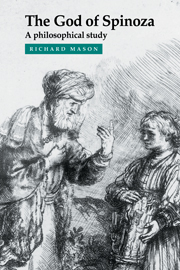4 - Final causes
Published online by Cambridge University Press: 06 January 2010
Summary
NATURAL THEOLOGY AND RELIGION
Whatever we desire and do, whereof we are the cause in so far as we have the idea of God, that is, in so far as we know God, I refer to religion.
Despite this apparently clear statement, for Spinoza, the connection between God, or knowledge of God – natural theology – and the human practice of religion was not simple or direct. Religion was seen as a human activity in society and in history, in terms of morality, social order and ritual. In the Ethics, where God appears from the first page, and where God's existence is allegedly proved, religion is scarcely mentioned. Where it is mentioned, this is sometimes in a startlingly naturalistic way:
By disapproving of wrong actions and frequently rebuking their children when they commit them, and contrariwise by approving and praising right actions, parents have caused the former to be associated with painful feelings and the latter with pleasurable feelings. This is further confirmed by experience. For not all people have the same customs and religion [Nam consuetudo, & Religio non est omnibus eadem]. What some hold as sacred, others regard as profane; what some hold as honourable, others regard as disgraceful. So each individual repents of a deed or exults in it according to his upbringing.
- Type
- Chapter
- Information
- The God of SpinozaA Philosophical Study, pp. 117 - 131Publisher: Cambridge University PressPrint publication year: 1997



